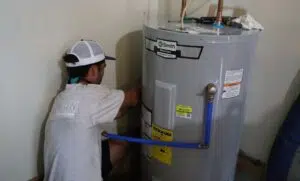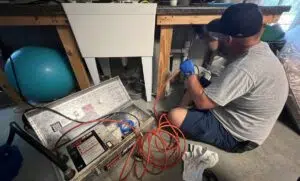A slow-draining kitchen sink is a common problem that many homeowners face. Dealing with clogged pipes can be extremely irritating and nearly impossible to resolve.
Not only that, when the pipe is backed up water will enter your sink, emitting a putrid odor while potentially harming your plumbing system.
To aid our readers, we have written this post to offer some of the best strategies for avoiding annoying clogs in your kitchen sink drain!
Tip #1: Use a Sink Strainer
Stop clogs in their tracks with a sink strainer! They are an easy and cost-effective way to keep your kitchen plumbing healthy, as they catch those pesky food particles, grease, and other debris that could otherwise lead to dreaded clogs.
Plus, it’s simple – simply clean the strainer regularly for optimal performance.
Tip #2: Dispose of Food Properly
Avoid a slow-draining kitchen sink by disposing of food properly. Refrain from pouring grease, oil, and scraps down the drain; instead, deposit them in your trash or compost bin.
If you own a garbage disposal, use it sparingly and keep running cold water while it’s used to ensure debris is flushed away thoroughly.
Tip #3: Avoid Pouring Chemicals Down the Drain
It can be alluring to pour chemicals down the drain in an effort to unblock it, but this may cause more harm than good. Chemical-based cleaners not only damage your pipes, but they also pollute the environment.
A much safer approach is utilizing a plunger or plumbing snake; however if you do not know how to use these tools effectively, seek help from a qualified plumber.
Tip #4: Run Hot Water After Use
To avoid clogs, it is essential to run hot water for a few minutes after using your kitchen sink. This can help flush away any particles that might be stuck in the drainpipe.
When utilizing a garbage disposal, always remember to turn on the hot water while disposing of food waste; this process will ensure that all edible bits are broken down and make their way through the drainage system efficiently.
Tip #5: Clean Your Sink Regularly
To keep your pipes clear and clog-free, regular cleaning of your sink is essential. You can use a mild detergent with warm water to effectively clean the sink and make sure it’s dried thoroughly afterward.
Be mindful not to employ abrasive cleaners or scrubbers as these could potentially cause scratches in the surface which will trap food particles and debris over time.
Tip #6: Use Baking Soda and Vinegar
To address a slow-draining kitchen sink, you can use baking soda and vinegar as natural cleaning agents. Start by mixing 1/2 cup of baking soda with 1/4 cup of vinegar and then pouring it directly into the drain.
Let this mixture sit for a few minutes before flushing down hot water to break down the buildup in the pipes and maintain easy flow through them.
Tip #7: Install a Water Softener
If you are dealing with hard water, then limescale and mineral buildup in your pipes could be the result. To avoid such a stubborn problem, why not install a water softener?
These systems remove minerals from the water that can otherwise cause a blockage in your pipelines. Investing in one today will ensure clearer waterways for years to come!
Tip #8: Don’t Overload Your Garbage Disposal
Garbage disposals offer a convenient way to get rid of food scrap, but overloading them can cause clogs. Therefore, it is important not to dump too much food down at once and always run cold water when using the disposal. Doing this will ensure that your garbage disposal runs optimally so you won’t have any problems in the future.
Tip #9: Call a Professional Plumber
If your kitchen sink is draining slowly and you can’t seem to fix it, then the time has come to ring up a professional plumber.
Not only will they identify what’s causing the backup, but also present options for resolving it as well as preventative measures that keep your plumbing running smoothly. With an expert on hand, you can relax knowing that all of your drain-related issues are taken care of.
Tip #10: Schedule Regular Maintenance
To ward off clogs in your kitchen sink, set up standard maintenance with a plumber. These experts can inspect the pipes and drains for any potential stoppages or debris that could be breeding grounds for future blockage.
In addition, they are able to recommend ways to safeguard against further complications from arising. Regular tending of your plumbing system is essential if you wish it continues functioning without costly repairs later on down the road.
Final Thoughts
Caring for your kitchen sink and pipes is the best way to maintain clear waterways.
From utilizing a plunger or plumbing snake to using baking soda and vinegar, there are plenty of ways you can keep your kitchen sink in good condition. If all else fails, don’t hesitate to call a professional plumber for help.
Before anything else, it’s a good idea to get an inspection on your home’s plumbing system right away. You can do so by getting in contact with the Rooter-Man in Charleston today!







